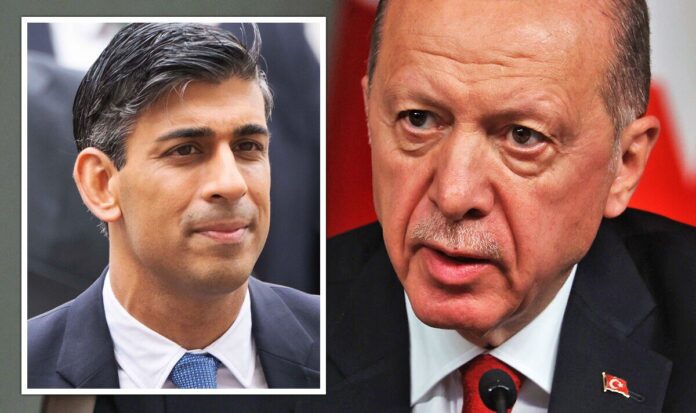A diplomatic blunder by Britain’s High Commissioner to Cyprus Irfan Siddiq looks set to overshadow Rishi Sunak’s first face-to-face meeting with the newly elected President of Turkey Recep Erdogan. There has been a huge backlash as a result of a recent meeting Mr Siddiq had with UK expats living in the Turkish Republic of North Cyprus (TRNC), which is only officially recognised by Turkey. During the meeting Siddiq described the second wave of 1974 intervention by Turkey which in effect created the TRNC as “a land grab” and appeared to suggest that it meant the 1960 constitution for Cyprus no longer applied for the Turkish Cypriots. His comments have been taken as an offence against a key ally at the time of delicate negotiations on the future of NATO and there have been calls for Siddiq to be replaced. There are also concerns that the UK threatens to unpick the 1960 constitution then it could undermine Britain’s claim to the territory its two bases occupy on the island. Irfan Siddiq is Britain’s High Commissioner to Cyprus (Image: UK GOV) Speaking to British residents in the TRNC, the High Commissioner said of the controversial Turkey military intevention in 1874: “From my reading there were two phases of that occupation and arguably the first phase was legitimate and the second was a land grab to consolidate the security.” Suggesting that the Turkish Cypriots had lost the rights esstablished in 196 when the UK ended its colonial rule, he said: “The reality is they [Turkish Cypriots] are not going to have the same rights until you have a settlement, which is agreed. “Because nowhere in international law in the UN will anybody recognise that rights can be accrued through a military operation.” In words which have also “caused deep offence in Turkey” he also compared the intervention to Russia invading Ukraine . Turkey and the Turkish Cypriots have pointed out that the second wave of attacks in 1974 happened when Greek Cypriots began mass murders of women and children doring the crisis which had been caused when a military junta wanting unity with Greece had taken over. One horrific incident in the 1974 tensions saw 126 Turkish Cypriots from the Murataga and Sandallar villages slaughtered on August 14 and then dumped in a mass grave near a rubbish tip. The Turkish newspaper Bugun Kibris has carried a front page condemning the High Commissioner’s comments. President Ersin Tatar spoke to David Maddox (Image: Rikki Williams) Meanwhile, Erdogan has made it clear that resolving the 49-year-old Cyprus crisis and partition is now one of his top priorities. His first trip to another leader after getting reeected was to TRNC President Ersin Tatar. It is also understood that he raised the need for TRNC’s recogntion in the protracted talks over Sweden’s entry into NATO. Speaking to TRNC President Ersin Tatar said that saying Turkish Cypriots had lost their 1960 rights would undermine UK claims to its two bases. He warned: “You cannot pick and choose [with aspects of the 1960 constitution].” Tatar described Siddiq’s statement as “unprecedented” and said “things are getting worse with the British government.” It is understood that Turkey intends to raise its anger over the comments privately and the subject could come up unofficially in the bilateral meeting today. Since 1974 Cyprus has been partitioned with only the Greek southern section recognised by the international community. A number of attempts to create a federal solution have failed because they have been vetoed by the Greek Cypriots, most natably the 2004 plan drawn up by former UN Secretary General Kofi Annan which was accepted by the Turkish Cypriots. President Tatar along with President Erdogan recently introduced annew policy of abandoning plans for a federal solution nd instead pushing for acceptance of two states. The proposal has been rejected by Cyprus who have just elected a new president Nikos Christodoulides. But Tatar argues that after almost five decades apart a federal solution is no longer realistic. Responding to the claims against the High Commissioner, a Foreign and Commmonwealth Office spokesman said: ‘These accusations are false and do not accurately represent the comments of the High Commissioner. “UK policy on Cyprus is long-standing, well-documented and remains unchanged, and we continue to fully recognise the 1960 Treaty.’
Crunch NATO talks between Sunak and Erdogan overshadowed by ‘land grab’ row
Sourceexpress.co.uk
RELATED ARTICLES


